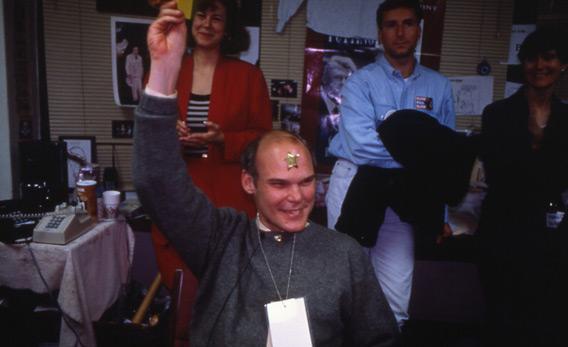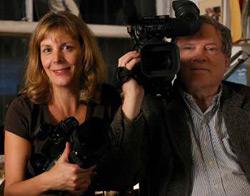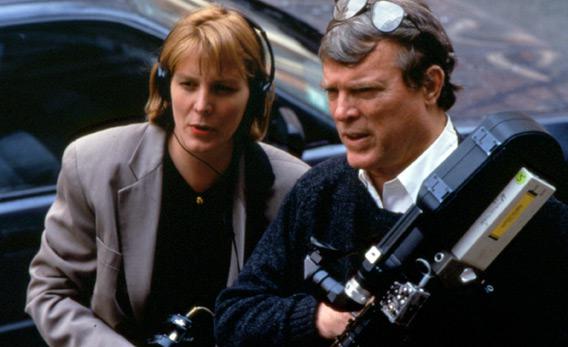James Carville is at campaign headquarters. He’s wearing a hideous polo shirt the color of Satan’s rainbow and giving a fist-pumping St. Crispin’s Day speech. “Outside of a person’s love,” he says, “the most sacred thing they can give is their labor. And you have combined labor with love.”
Anyone who’s seen The War Room has just undergone a happy flashback: Ah, yes, that was one of the scenes that made me understand politics. The 1993 documentary about Bill Clinton’s presidential run revealed how campaigns actually worked. It exposed all the boredom, riffing, panic, and media-manipulating bullshit that separates the winning candidate from the loser—even though the loser’s trying to do all of this stuff, too.
Every subsequent political documentary—the Obama doc By the People, the Ollie North/Chuck Robb nightmare A Perfect Candidate, Hegedus/Pennebaker’s own Al Franken doc God Spoke—has followed the same beats as The War Room. When they’ve worked, they’ve worked in the exact same ways.

Courtesy of The Criterion Collection. All rights reserved.
Today the Criterion Collection releases a new edition of the documentary, dressed up nicely with special features. We get a new, full movie, Return to the War Room, which re-interviews the first movie’s subjects (not Bill Clinton). It’s interesting to see the spoils of victory—these people have put together comfortable Washington/New York axis-of-power lives—but apart from some good new anecdotes, it’s not overly involving. The better stuff comes when Hegedus and Pennebaker talk at length about the film and reveal how they made it. The two big takeaways: They got lucky, and probably no one will ever get this lucky again.
I talked to the filmmakers earlier this week.
Slate: In one of the interviews that accompanies this new DVD, D.A. says that the original intent was to make a movie about Bill Clinton. Why didn’t that happen?
Chris Hegedus: We thought that we’d meet him, and then he’d think we were nice, we were not threatening, and it was just the two of us, and that we could follow him around. But there was already a photographer, a journalist from Newsweek writing a book, Mark Miller. We thought: If he sees how small and unthreatening we are, maybe he’ll have us around, too. But, you know, that never really happened.
D.A. Pennebaker: I got kind of spoiled with the Kennedys. I knew Bobby very well. I didn’t know Jack in particular, but he had friendly, kind of arrogant attitude towards media. I could film him swearing away like a trooper, and he know that I’d never use it or couldn’t use it. That’s what he knew. So we got kind of used to them just letting us do whatever we wanted.
I had been unable to make the film with Bobby which I had wanted to do and had started to do—I had actually filmed some—but I just didn’t have the funding and couldn’t keep up with him. But here, in 1992, we were going to do a film on a man becoming president. Now when you announce that, it sounds like a good idea, and you assume that his handlers said, “Well if they can’t do it, then nobody can do it, so let’s try.” And it wasn’t until we sort of got caught up with him ambling around in the hotel that I began to worry. He’s running for president. We were two people with our asses hanging out of our pants trying to keep up with him. He wasn’t gonna let us in. So, I wasn’t surprised when George told us that we couldn’t. We asked George if we could hang out with him and with the newly discovered Carville, and he hesitated a minute and said, “Well, if Carville thinks it’s OK, then I guess it’s OK.”
Slate: And how did that go?
Pennebaker: We went to Little Rock. There was this huge basketball-court-sized office that Carville had stuck himself in, surrounded by people and beer cans and popcorn. I mean, it wasn’t anything like what we expected to find in what it was called a “war room.” He said, “Well, what do you want?” He was very polite. And there he was, sitting there in front of his desk with our camera and our tape recorder, and we said, “Well, we’d just like to hang out with you here and see what happens.” And he thought a minute, and he said, “Why should I let you do that?” The only answer you could ever give to this was, “Well, because you want to.” So he said, “I’ll have to think about that.” He went back to his hotel, and about an hour later, he said, “OK.” And that was it.
Slate: So how did being this close to the candidate and his team change the way you looked at them?
Pennebaker: The only other person that I ever know in political life was Bobby Kennedy, and he would play around with stuff, but most of the time, they force themselves to put on these masks of indifference and political sovereignty, so you’d never see a person you might have gone to high school with. [Whereas] George and James were like two kids in the rumpus room.
Hegedus: It was really infectious. I mean, we were really early fans of Clinton in the beginning when he was one of many candidates. We didn’t know him very well, but I think the moment we met the people who surrounded him, but their impression of him, it was so strong, that it really changed our minds.
Slate: There’s a moment in the sequel, which is part of this DVD set, when you revisit what happened in 2008. Someone clipped a section of The War Room of campaign chairman Mickey Kantor analyzing Indiana returns and doctored it to make it sound like he was insulting them. You use footage from CNN discussing the doctored version, and Anderson Cooper saying, “This is out there on the Internet, so we want to bring it to you.”
Hegedus: You know the irony of that story for us was when we wanted to use that in the second film, CNN charged us—and it was our film! It was sort of outrageous, you know?
Slate: How much did they charge?
Hegedus: Oh, it was actually a lot. It was a huge battle with the lawyers there to even get to use our film in their report because of Anderson Cooper being the TV personality in it. They didn’t want us to use their report of our film. They charged a lot; I think in the end we had to pay something like $12,000; they wanted more.
Slate: I bring that up because the expectation now is that video can be uploaded instantaneously, and that any video is as worthwhile as the next one, regardless of the source. Could you make another documentary like this about a presidential campaign?
Hegedus: No, it’s a totally different world.
Pennebaker: When we did the second film, we ran into a whole new problem, which was following people around with a recorder and a camera—because they’re one thing now—and they had cell phones, and they didn’t want us around all the time.
Hegedus: The cell phone kind of makes it offices everywhere at every minute of the day, where back in 1992, you had to talk on a landline, for the most part, somewhere, so you were at your desk talking on your phone, having your business time. I wouldn’t know how to shoot a film in this era, where everything is just out there immediately, and people are so aware of media and how it can be misused.

Pennebaker Hegedus Films.
Pennebaker: You know, the thing that was sort of funny for us in 1992 was most of the television coverage of any of the candidates was of them going in and out of hotels. You realize the picture itself doesn’t give very much information that you don’t already know, but whoever put it on the air, it gave them a chance to talk about something they had else-wise about the campaign. It was the door, in a sense, in and out of their story. They would have maybe 10, 15 cameramen with Ikegamis and huge microphones on long sticks waiting at the doors of the hotels where people were going to come and go, with no intention of interviewing them, really; they just wanted to watch them come and go. Which was peculiar.
Slate: Let’s say you actually could do this again. Who, in 2012, would you want War Room-style access to?
Hegedus: I’d still like to get access to Clinton.
Pennebaker: Or Hillary.
Hegedus: Yes, Hillary. You know, unfortunately, she never has been filmed in that way. I don’t know if you’ve spent any time around her, but she’s a much different person and kind of much funnier and interesting than she ever lets herself come out to be I think in other public situations.
Slate: She’s not really in The War Room at all.
Hegedus: No, she’s hardly in The War Room. Just in the beginning.
Pennebaker: We did film her a little but we didn’t use it. But you know who would be interesting for me? I would like to spend—it’s kind of ridiculous – but it would really interest me to spend a week with the ex-governor of Alaska, whatever she’s doing, just to watch her daily conversations with whoever she has…
Hegedus: She already had that, Penne. She had a reality show.
Pennebaker: I never saw it, but that was cooked up by Fox! I mean a real documentary. She might do it. People do this for funny reasons. I always wanted to do something with Nixon because I thought, you know, a Thanksgiving dinner with Nixon and all his family would be fascinating. You could just see him sitting at the end of the table with the turkey. Here’s a person who knew more about what was going on in the world than anybody alive. And the grandmothers would say, “Just carve the turkey, Dick, No more political talk.”
This interview has been edited and condensed.
